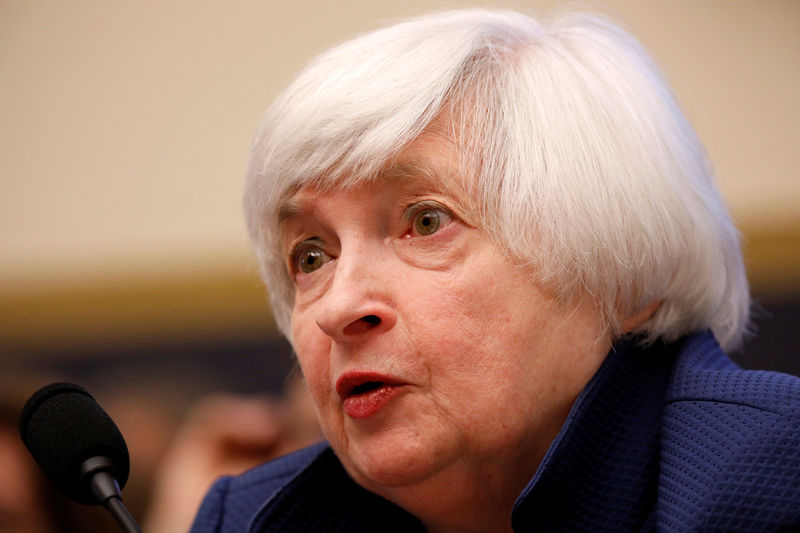By Howard Schneider
WASHINGTON (Reuters) - The U.S. economy is healthy enough for the Fed to raise rates and begin winding down its massive bond portfolio, though low inflation and a low neutral rate may leave the central bank with diminished leeway, Fed Chair Janet Yellen said on Wednesday.
In what may be one of her last appearances before Congress, Yellen depicted an economy that, while growing slowly, continued to add jobs, benefited from steady household consumption and a recent jump in business investment, and was now being supported by stronger economic conditions abroad.
The Fed "continues to expect that the evolution of the economy will warrant gradual increases in the federal funds rate over time," Yellen said in her prepared testimony. Reductions in the Fed's portfolio of more than $4 trillion in securities are likely to begin "this year," she said.
But she also noted that given current estimates, the federal funds rate "would not have to rise all that much further" to reach a neutral level that neither encourages nor discourages economic activity. The Fed still feels the economy needs loose, or accommodative, monetary policy, so a lower neutral rate means the Fed may feel compelled to slow the pace of rate hikes down the road.
But for now, Yellen told members of the House Committee on Financial Services, the economy remains strong enough for the Fed to continue to gradually tighten policy. In response to questions from lawmakers, she said she expects the gradual run down of the balance sheet will "play out smoothly" in markets.
The reduction in the balance sheet, which will begin slowly as the Fed reinvests only a portion of the holdings that mature each month, will mark the final exit from crisis-related policies.
ECONOMY ON EVEN KEEL
Yellen's past appearances before the House panel have sometimes involved sharp exchanges with lawmakers who think the Fed's influence over the economy has grown too strong. Such lawmakers want policymakers to be guided more closely by a mathematical rule for setting interest rates.
This session was a more sedate meeting, with Committee Chair Jeb Hensarling, an advocate "rules-based" monetary policy, complimenting the Fed for including comparisons of its monetary policy with some of the more common formulas.
Her appearance, coming as the Trump administration mulls whether to replace her when her term ends in February, broke little new ground in terms of policy or regulatory changes.
"We have a relatively light regulatory agenda at this point," Yellen said. She confirmed the Fed was reviewing some of the requirements imposed on bank boards of directors following the financial crisis, with any eye towards possibly easing some of them.
She also repeated the Fed's strong opposition to proposals that policymakers worry could give elected officials influence over what are supposed to be independent Fed interest rate decisions.
According to her testimony the economy is on an even keel, near or beyond full employment.
U.S. stocks rose, while yields on Treasury bonds fell and the dollar was little changed against a basket of currencies.
In a separate release, the Fed's latest beige book of reports from regional Fed banks showed "slight to moderate" economic growth across the country.
A recent dip in inflation has been of concern among Fed officials who want to see surer progress toward the central bank's 2 percent inflation goal. Yellen, however, ascribed it to "a few unusual reductions in certain categories of prices" that would eventually drop out of the calculation.
The current situation "raises the stakes" for upcoming inflation data, said Jim Vogel, interest rate strategist for FTN Financial in Memphis, Tennessee. "People are going to be very anxious if that was just a statistical glitch...or if it is going to continue."

Otherwise, Yellen said, the economy appeared to be in a virtuous loop of hiring, spending and investment that "should increase resource utilization somewhat further, thereby fostering a stronger pace of wage and price increases."